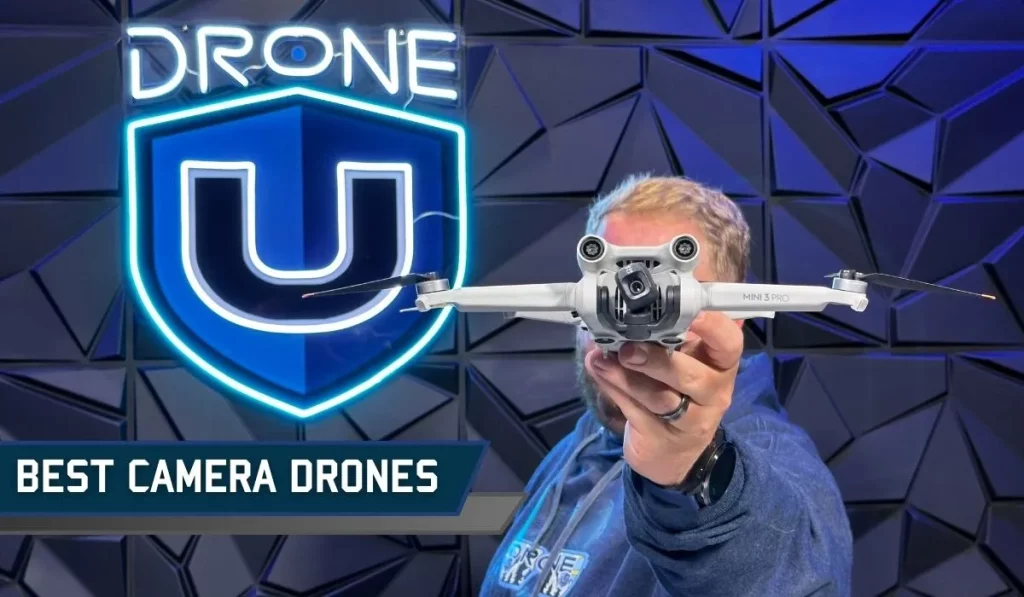
If you’re aspiring to take flight as an aerial photographer or videographer, camera drones are your ticket to overcome your fear of heights.
In not so distant past, drones with cameras didn’t exist and aerial shots came at an extreme expense to production companies.
Fast forward to the era of social media and camera drones have become mainstream.
Drones make acquiring a myriad of aerial and ground shots attainable, without having to buy expensive equipment.
Expensive shots are now cheaper, but it is just about the equipment alone. The best aerial photos are a culmination of cinematic skills made easy by cameras stabilized on gimbals hanging in the air.
And it’s important to choose the right equipment in the first place.
When it comes to finding the right drone model, it is important to know that a good pilot can create epic stories no matter what drone they are flying.
More advanced drones typically have better obstacle avoidance, automated flight paths, and insane camera features. Don’t confuse obstacle avoidance and these features with safety.
The safest of the drones are going to be enterprise drones. These drones offer sensor-denied flight modes, and emergency health information, and provide additional support to keep batteries healthy for long periods.
After test-flying these drones and working with many of them on real-life drone jobs, we can provide experienced-based insight into the best drone with a camera on the market.
How To Choose The Best Drone With Camera
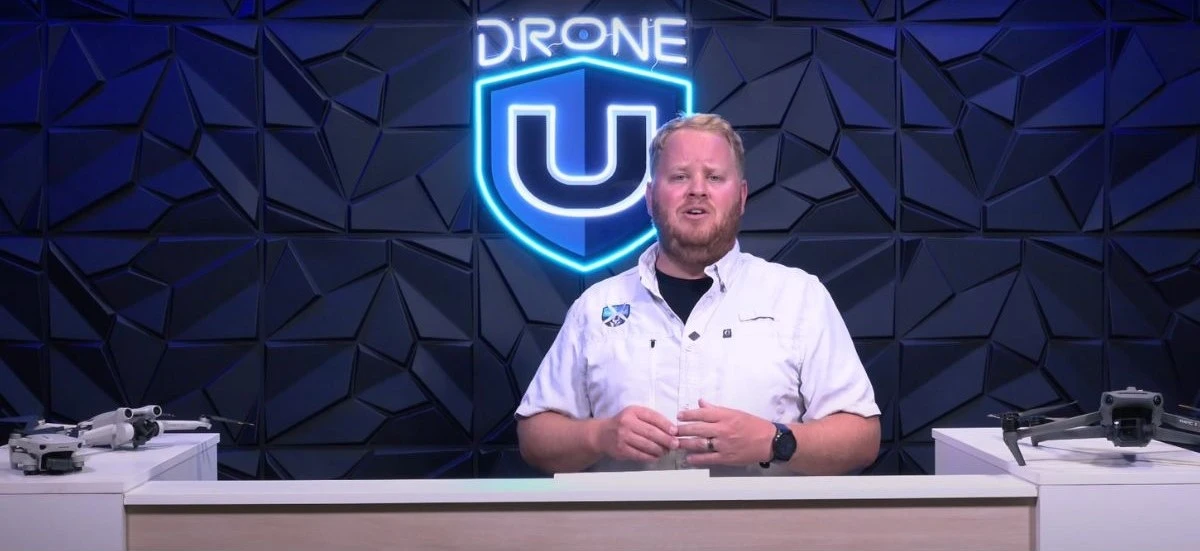
Camera Quality
The quality of the camera is vital for achieving exceptional results in aerial photography and videography.
First, consider the sensor size; a larger sensor captures more light, resulting in superior image quality, especially in low-light situations.
Second, take into account the camera’s resolution, which determines the level of detail in your photos and videos. Higher resolutions like 4K, 6K, or 8K offer greater clarity and creative flexibility.
Lastly, gimbal stabilization is crucial for ensuring that your footage remains smooth and steady.
A well-stabilized gimbal compensates for the drone’s movements, keeping your shots jitter-free and professional.
Flight Time
Extended flight times are advantageous in photography and videography, allowing you to capture more content before needing to land and recharge.
Keep in mind that actual flight time can vary based on factors like wind conditions and payload.
Portability
Portability is a critical consideration, particularly if you plan to travel with your drone.
The size and weight of the drone will impact how easily you can transport it to different locations.
Smaller, more compact drones are often preferred for their ease of handling and storage, although they may sacrifice some features compared to larger, less portable models.
Assess your needs and consider the trade-off between portability and the capabilities required for your needs.
Obstacle Avoidance
Safety is of utmost importance when flying a drone for photography and videography, and obstacle avoidance technology can significantly enhance it.
Drones equipped with obstacle avoidance sensors use cameras and other sensors to detect and avoid obstacles in their flight path.
This feature not only safeguards the drone from collisions but also provides peace of mind, allowing you to focus on capturing your content without the constant worry of environmental obstacles.
Range
The control range of a drone is a crucial factor in achieving dynamic and captivating shots.
A longer control range allows you to fly the drone further from your location while maintaining a stable connection to the remote controller.
This increased range offers more flexibility for exploring different perspectives and capturing shots from greater distances, which can be particularly valuable in aerial photography and videography.
Controller and App
The remote controller and accompanying app play a pivotal role in your overall flying and shooting experience.
Evaluate the quality of the remote controller, including its ergonomics, ease of use, and the range of controls it provides.
The accompanying app should offer features such as live video streaming, waypoint planning, camera settings adjustment, and a user-friendly interface.
A well-designed controller and app can make your drone operations more efficient and enjoyable.
Price
Your budget is a key factor in choosing the right drone for your photography and videography needs.
Establish a budget range and look for a drone that offers the best features and capabilities within that range.
While high-end drones typically offer superior camera quality and advanced features, there are excellent options available at various price points.
Consider the trade-offs between cost and the specific features that matter most to you to make an informed decision aligned with your financial resources.
Before we delve into our list of the best camera drones, let’s introduce you to our top picks that can assist you in selecting the most suitable drone for your needs.
List of 8 Best Camera Drones
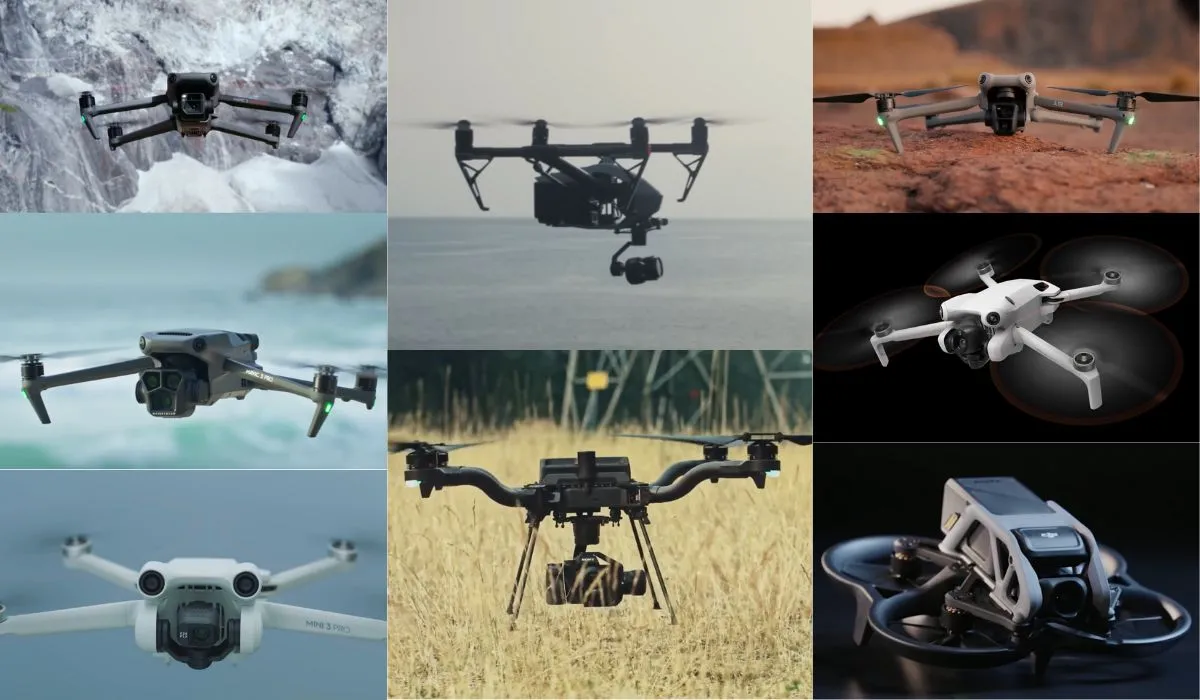
Here is the list of the best drones with cameras:
- DJI Air 3: All-around Option for Photographers and Videographers.
- DJI Mini 4 Pro: Best Travel Drone.
- DJI Avata: An FPV Drone – Perfect for Racing and Freestyle Flying.
- DJI Inspire 2: Professional-grade Drone – Popular Choice for Filmmakers and Photographers.
- Freefly Astro: Great for Professional Cinematographers and Content Creators.
- DJI Mavic 3 Enterprise: Made for Industrial and Commercial Applications.
- DJI Mavic 3 Pro: High-end Consumer Drone with Excellent Camera Quality.
- DJI Mini 3 Pro: Small, Lightweight & Budget-Friendly Drone.
We’ll dive into each drone and tell you more about the features, capabilities, and limitations of each.
1. DJI Air 3
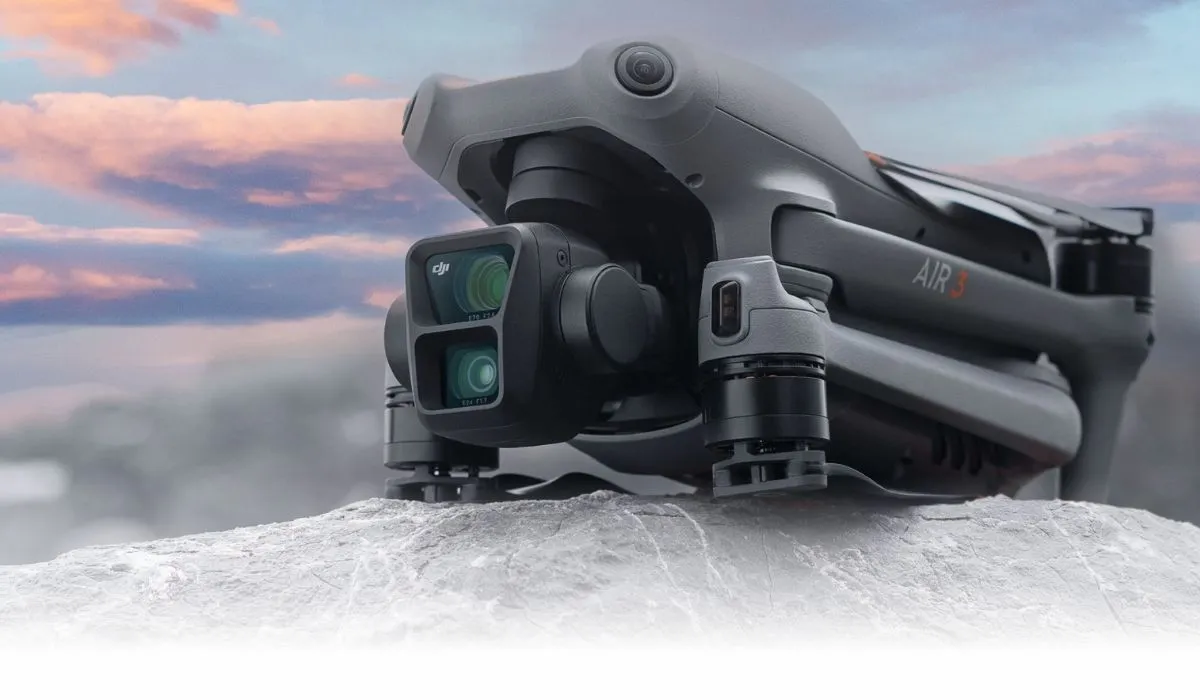 DJI Air 3
DJI Air 3
The DJI Mavic Air 3 is incredibly easy to fly, struts dual cameras, offers portrait video and has a long battery life. As with any drone, we would recommend the Fly More Combo option to provide enough batteries for a fun afternoon of flight.
Moreover, the Mavic Air 3 can sense and avoid obstacles approaching from any direction, and while it may not cover super small twig branches, it can be relied on for more flights.
Additionally, the drone will hover and hold its position even in moderate winds.
With dual cameras and the ability to shoot in vertical or portrait mode, creators can capture multiple perspectives from the sky. This drone even has hyper-lapse mode, allowing creators to create epic time-lapses that move, showcasing their favorite cityscape.
Furthermore, the Mavic Air 3 offers a suite of features that allows pilots to create unreal panos, and epic landscape pictures, capture stunning aerial video, and even create hyperlapses. It is very small, portable, and foldable, making it a versatile choice.
If you’re looking for a drone with 4K camera with the latest automated flight paths, obstacle avoidance, and a camera that shoots in portrait (social media) mode, look no further than the Mavic Air 3, which comes in at under $1,500 for the drone, remote, and multiple batteries (typically you buy more than 1 battery).
Features of DJI Air 3
| Features | DJI Air 3 |
| Takeoff Weight | 720 grams |
| Max Flight Time | 46 Mins |
| Max Flight Distance | 32 Km |
| Camera | 1/1.3-inch CMOS Wide-Angle Camera &
1/1.3-inch CMOS Medium-Tele Camera |
| Max Video Resolution | 4K/60fps HDR
4K/100fps |
| Video Format | MP4 |
| Obstacle Sensing | Omnidirectional |
| Transmission System | DJI O4 |
2. DJI Mini 4 Pro
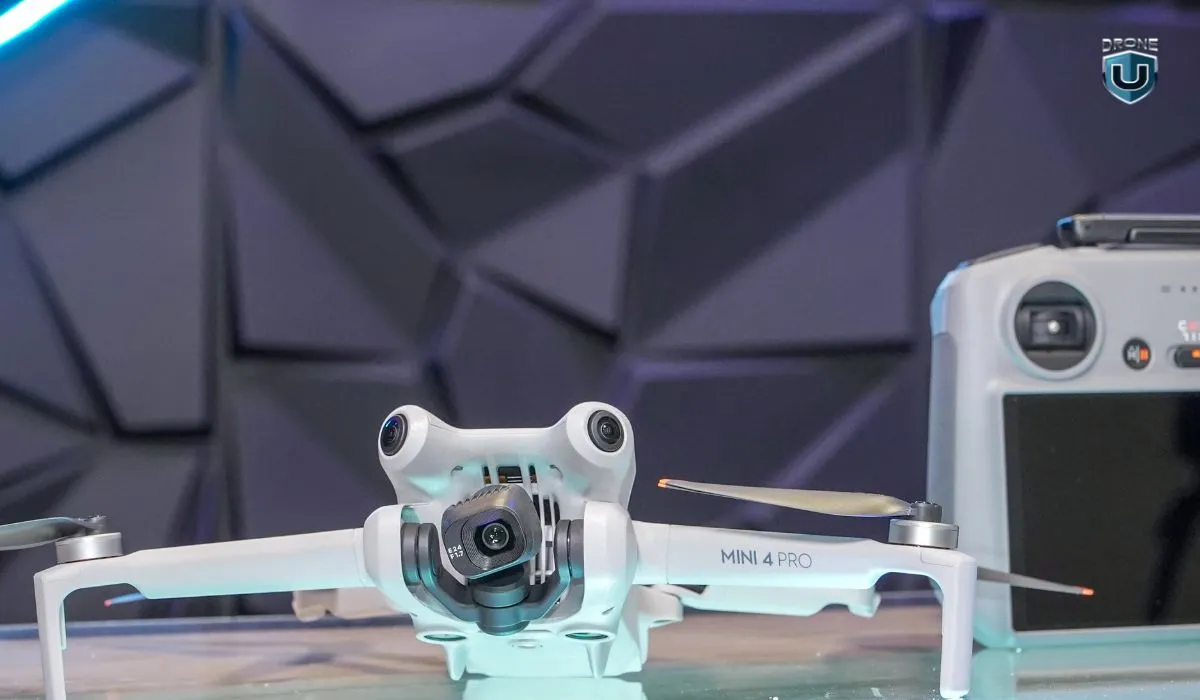 DJI Mini 4 Pro
DJI Mini 4 Pro
Ah, behold the DJI Mini 4 Pro drone – the triple treat of the drone world. It’s not just good; it’s the golden child of social media, the wanderlust companion of travelers, and the featherweight champ of the skies.
Let’s start with its social game. – This little whiz kid is the maestro of capturing those trendy vertical videos.
Its camera gimbal twirls around like a pro dancer, ensuring your social media content is as smooth as butter.
Say goodbye to awkward cropping – this drone is here to make your posts pop!
Now, when wanderlust calls, the DJI Mini 4 Pro has the answers.
Clocking in at less than 250 grams, it’s the travel buddy you’ve always dreamed of.
Want to fly this darling in Mexico?
No worries about permits or registrations!
Canada calling?
Fly in most spots without batting an eye.
Even in the good ol’ USA, it doesn’t need registration unless you’re using it for commercial gigs.
And hey, it’s not just its weight that’s light; the DJI Mini 4 Pro is a mini drone with 4K camera and flight time that’s more dependable than your morning coffee, and the ability to slip under the radar in most places.
So, if you’re the kind who loves making your social media shine, has a globe-trotting soul, and craves a drone that’s more portable than a pocketful of sunshine, the Mini 4 Pro is your match made in drone heaven.
Now, if you’re traveling a lot throughout the world, and you want a drone that won’t get you in trouble with the local aviation authority, buy a sub 250 grams drone.
In the US, Part 107 Pilots, the Mini 4 Pro is RID compliant and can be flown over people.
In Mexico, sub 250 grams drones don’t have to be registered.
Tourists flying sub 250 gram drones can take flight in most parts of Canadian skies without certification or permits.
That’s why the DJI Mini 4 Pro is the best travel drone we recommend.
However, if you’re on a budget, and vertical videos are a must, check out the budget-friendly small drone with camera Mini 3 Pro.
Features of DJI Mini 4 Pro
| Features | Mini 4 Pro |
| Takeoff Weight | < 249 grams |
| Max Flight Time | 34 Mins |
| Max Flight Distance | 18 Km |
| Camera | 1/1.3-inch CMOS Wide-Angle Camera |
| Max Video Resolution | 4K/60fps HDR
4K/100fps |
| Video Format | MP4 |
| Obstacle Sensing | Omnidirectional |
| Transmission System | DJI O4 |
3. DJI Avata
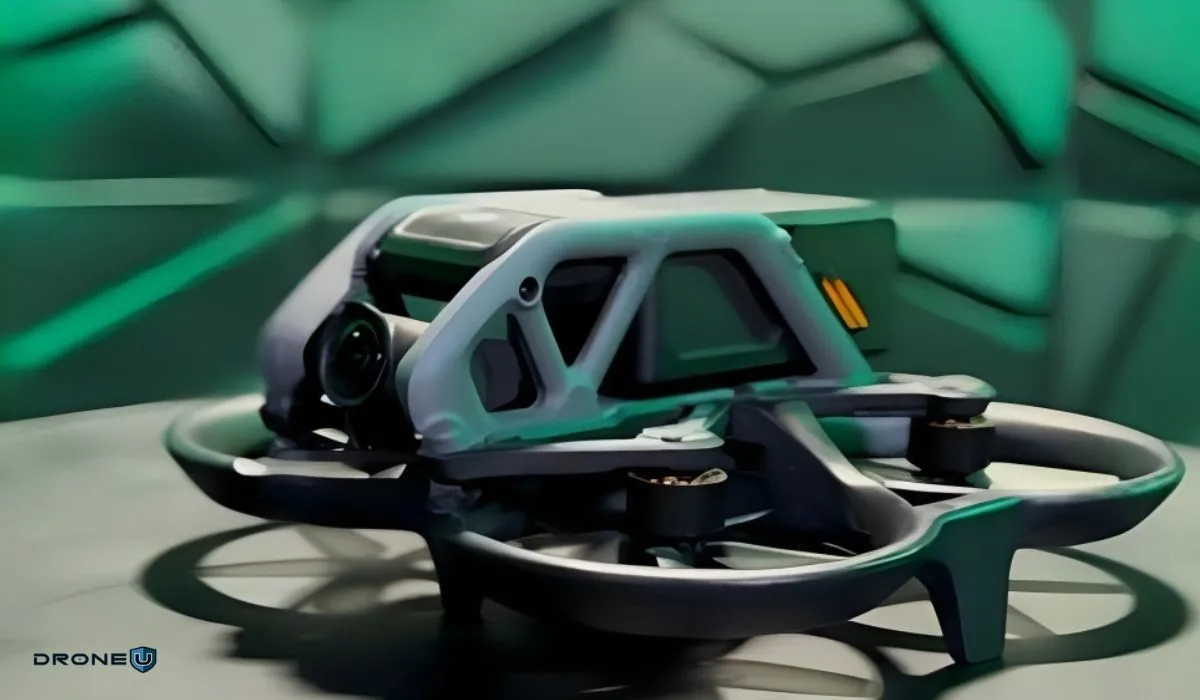 DJI Avata
DJI Avata
Meet the DJI Avata, a small 4K camera drone that comes with Motion Controller.
DJI Avata is the James Bond of the FPV drone world – sleek, sophisticated, and the pioneer of GPS in the wild, wild world of FPV.
You know, FPV drones used to be like renegade cowboys without a compass, but enter the Avata, the game-changer with a GPS and the ability to do something unheard of in the FPV realm – hover.
It’s like bringing a bit of zen to the adrenaline-pumping world of FPV.
Now, imagine this: An ultra-compact drone that can shimmy its way through indoors and effortlessly fly around capturing breathtaking fly-through footage of buildings, businesses, and national treasures. It’s like that daredevil acrobat, somersaulting through the sky and capturing all the beauty in its path.
This drone isn’t just a flying machine; it’s the friendly mentor at FPV flight school.
If you’re looking to dip your toes (or dive headfirst) into the exhilarating world of FPV, the Avata is your genie in a bottle.
It’s the easy-peasy, lemon-squeezy way to learn the ropes of FPV flight – perfect for anyone seeking a new, thrilling challenge up in the air.
Now, here’s the twist: this isn’t your regular drone that captures your average footage. Oh no, this baby records the world through the eyes of its pilot – it’s all about the First Person View.
So, if you’re ready to swap your aerial view for the pilot’s seat and experience the world from a whole new perspective, the Avata is your golden ticket to an exhilarating FPV adventure.
If you’re ready to fly through buildings, real estate shots, and wedding videos… the easiest FPV or cinewhoop drone on the market is DJI’s Avata.
The Avata is an easy-to-learn FPV drone with a camera, capable of capturing stunning one-take-wonder videos.
Features of DJI Avata
| Features | DJI Avata |
| Takeoff Weight | 410 grams |
| Max Flight Time | 18 Mins |
| Max Flight Distance | 11.6 Km |
| Camera | 1/1.7-inch CMOS Wide-Angle Camera |
| Max Video Resolution | 4K/60fps |
| Video Format | MP4 |
| Obstacle Sensing | Downward only with DJI FPV Remote Controller 2 or DJI Motion Controller in N Mode and S Mode |
| Transmission System | DJI O3+ |
4. DJI Inspire 2
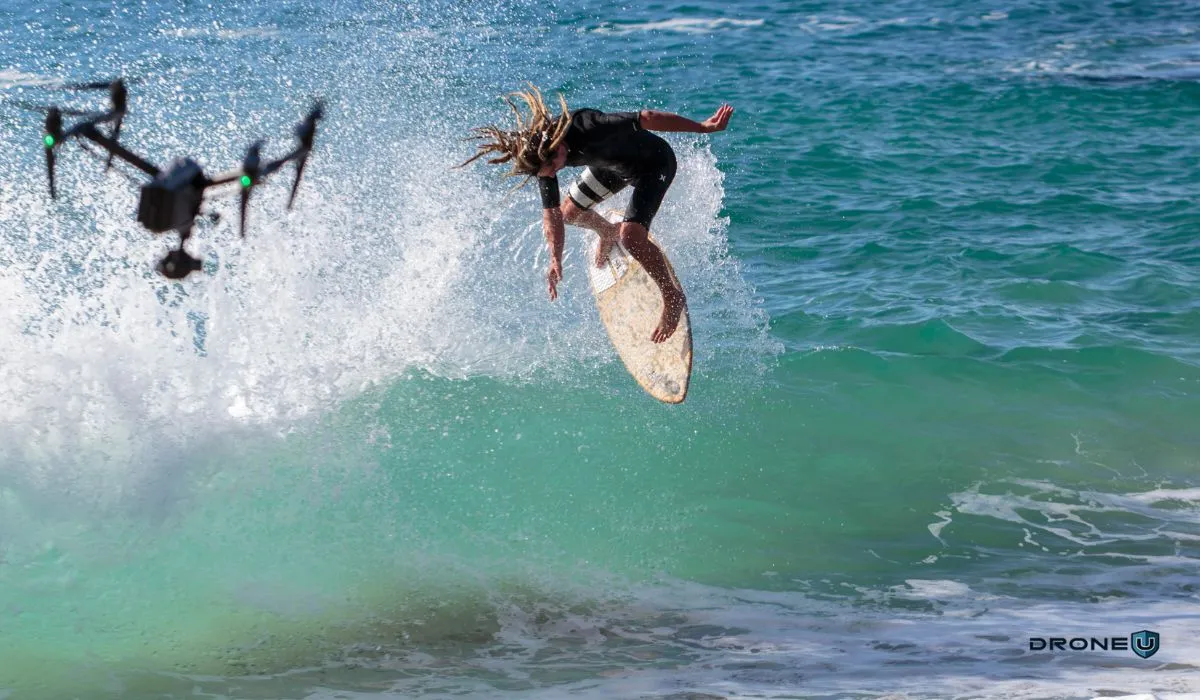 DJI Inspire 2
DJI Inspire 2
Inspire 2 Drone is the ‘Ford Raptor’ of the DJI skies.
It’s not just an RC drone with camera; it’s the adrenaline junkie’s dream ride, ready to conquer the wild and capture the most electrifying shots in the air.
Picture this: Wind that could sweep Dorothy off to Oz doesn’t faze this bird. It’s the Maverick of stability, owning the high winds like it’s a leisurely stroll in the park.
And when it comes to payload, it’s like that friend who’s always ready to lend a hand.
Multiple large format cameras?
No problem, it’ll carry them with a swagger.
Action sports?
Cue the dramatic music!
The Inspire 2 is the aerial daredevil that zooms through the skies like it’s on a mission, smoothly tracking high-speed action and edging closer to the subjects like a seasoned pro.
But hey, let’s be real – it’s like handing the keys of a Ferrari to a professional race car driver.
Only a top-tier pilot can truly unleash its full potential.
And here’s the golden nugget: the Super 35mm x7 camera.
This isn’t just a camera; it’s a wizard behind the lens.
Shooting native anamorphic 4K video at an aspect ratio that screams “blockbuster”, it’s the MVP when you’re aiming for that Netflix-level filming.
So, if you’re ready to embark on a film-making journey, where the sky’s the limit and every shot is a cinematic masterpiece waiting to happen, the Inspire 2 isn’t just a drone; it’s your passport to Hollywood-worthy aerial footage.
And yes, we know the Inspire 3 is out… save yourself 14,000 and buy an Inspire 2.
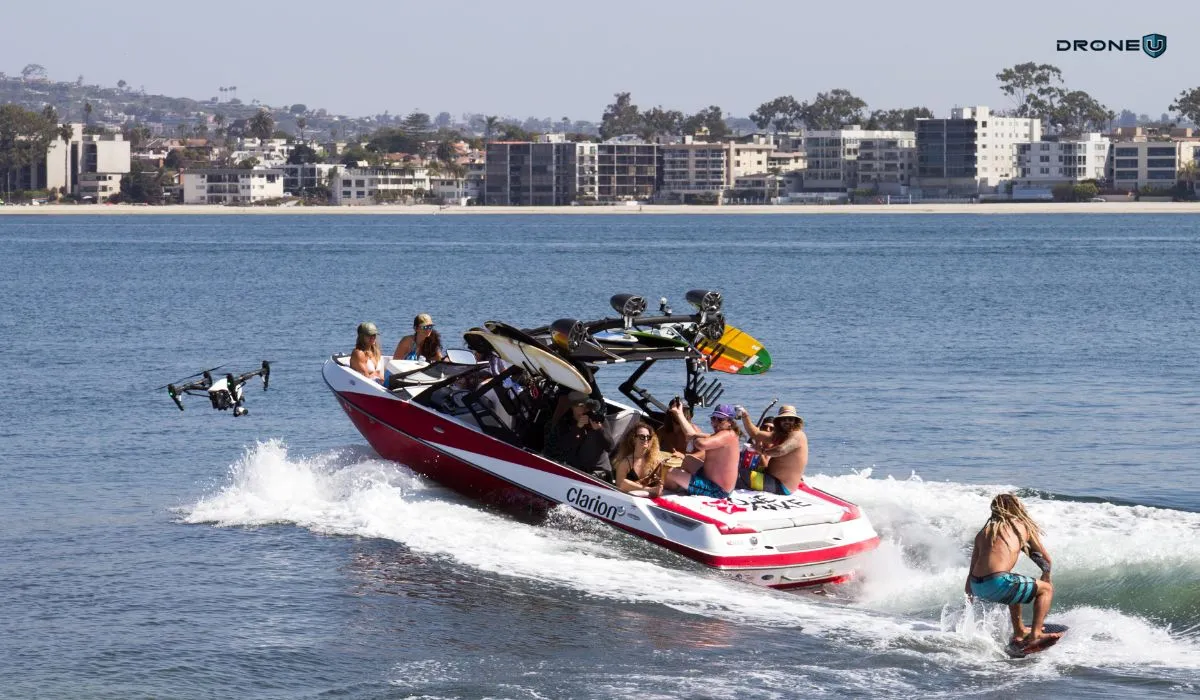
If you’re into action sports, shooting for production houses like Netflix, or you simply want to make some noise as a drone pilot, check out the Inspire 2.
The Inspire 2 shoots an ultra-wide 4K at the anamorphic or 2.44:1 aspect ratio natively on the X7 camera.
While we know the newer Inspire 3 is out for consumers to purchase, they’ll have to pay significantly more for a few feature gains.
To understand how different the flight experience is with an Inspire, you would compare the Inspire to a Ferrari. All of the other drones would be some model of Toyota, especially if they’re made by DJI.
DJI Inspire 2 Review
Features of DJI Inspire 2
| Features | Inspire 2 |
| Takeoff Weight | 4250 grams |
| Max Flight Time | 27 Mins (with Zenmuse X4S) & 23 Mins (with Zenmuse X7) |
| Max Video Resolution | 6K in CinemaDNG/RAW & 5.2K in Apple ProRes both @ 30fps |
| Operating Temperature | -20° to 40° C |
| Obstacle Sensing | Upward & Downward |
| Transmission System | DJI Lightbridge 2 |
| App | DJI Go 4 |
5. Freefly Astro
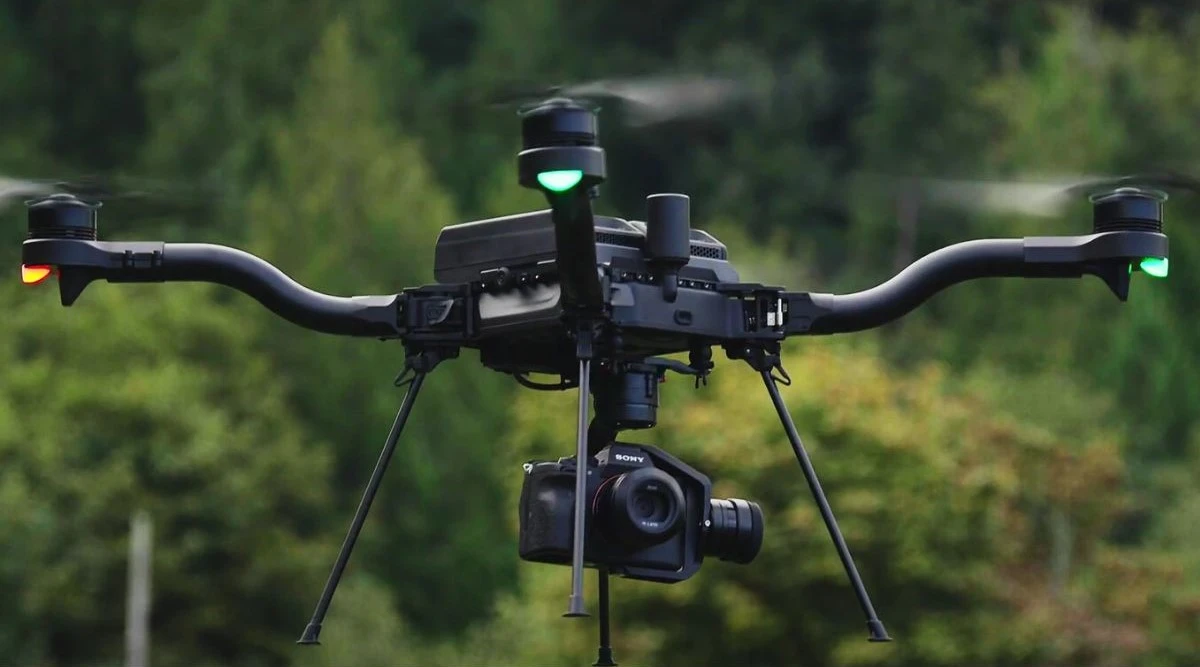 Freefly Astro | Source: Freefly
Freefly Astro | Source: Freefly
The Freefly Astro is a lightweight and portable drone, making it easy to transport and deploy. It is one of the best drones that comes with a 61 MP camera. It has a maximum payload of 1,500 grams, which is enough to carry a variety of cameras and sensors.
The Astro also has a long flight time of up to 30 minutes, which means you can get a lot of work done in a single flight.
The Astro is controlled using the Freefly Pilot Pro controller, which features a long-range radio link and a variety of features that make it easy to fly the drone precisely. The controller also has a built-in screen that displays real-time telemetry data from the drone.
If you’re trying to get serious about Videography and drone mapping and would like to support domestic manufacturers, look no further than the Freefly Astro.
Features of Freely Astro
| Features | Freefly Astro |
| Takeoff Weight | 6,665 grams |
| Max Flight Time | 37 Mins (Without Payload) |
| Camera | 61 MP |
| Operating Temperature | -20 to 50 C |
| Connectivity | BLE, Wifi, USB C, LTE (North America) |
6. DJI Mavic 3 Enterprise
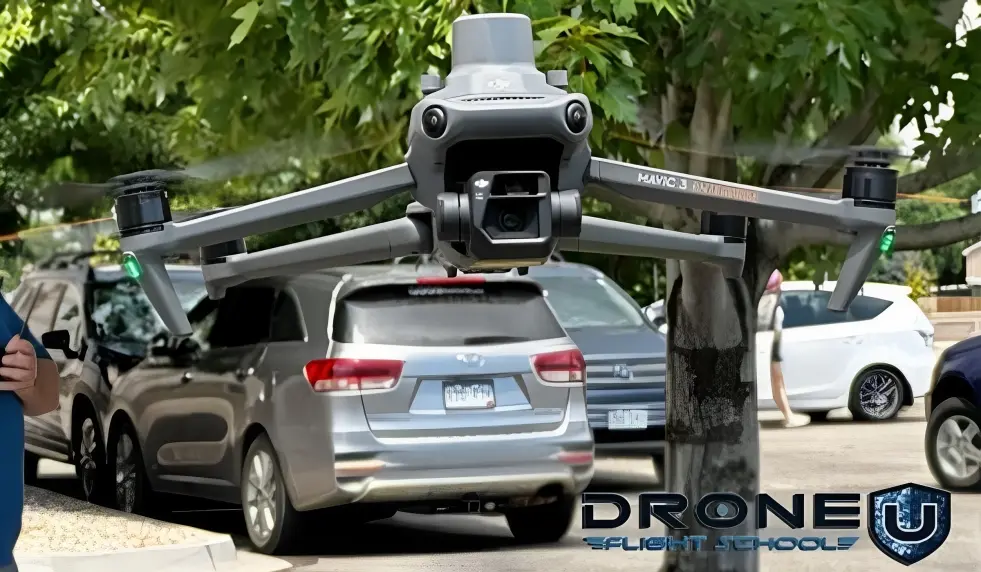 DJI Mavic 3 Enterprise
DJI Mavic 3 Enterprise
Here comes the DJI Mavic 3 Enterprise, where the sky isn’t a limit, but rather, your playing field.
Picture the Mavic 3’s sophisticated capabilities combined with a strong dose of safety enhancements, and you’ve got the Enterprise version, akin to your standard Mavic 3 but equipped with a superhero’s cape and an array of advanced safety features.
Its Attitude Mode is your key to becoming a master of the skies. This mode enables you to capture smooth shots, approach your subjects up close (because sometimes distance is overrated), and land the drone gracefully without its sensors causing any trouble.
Say goodbye to worries about flyaways with this mode – nothing escapes your watchful eye.
Ever dreamed of becoming a digital cartographer?
The Mavic 3 Enterprise empowers you to create 3D maps and models effortlessly.
Its suite of autonomous software turns you into a mapping virtuoso.
Moreover, the Mavic 3 Enterprise isn’t just a drone; it’s a versatile platform for your aspirations.
Need additional applications? No problem!
You can enhance the remote control with extra apps to expand its capabilities. Think of it as equipping your drone with a toolbelt and saying, “Let’s get to work!”
Wondering who this exceptional device is designed for?
Think of the professionals – those soaring high in utility inspections, the architects of construction projects, and the engineers shaping the future.
This drone is far from being a mere toy; it’s crafted for professionals who are earning lucrative incomes in technical fields.
If you belong to that league, the Mavic 3 Enterprise might just become your trusted partner in the skies.
However, the Mavic 3T, a variant of the Mavic 3 series, is a best-buy drone with a thermal camera. This thermal version makes it ideal for various applications, including firefighting, search and rescue, inspection, and night operations.
Features of Mavic 3 Enterprise
| Features | Mavic 3 Enterprise |
| Takeoff Weight | 1,050 grams |
| Max Flight Time | 45 Mins (No wind) |
| Max Flight Distance | 32 Km |
| Camera | 4/3 CMOS 20 MP Wide Camera, 1/2-inch CMOS 12 MP Tele Camera |
| Max Video Resolution | 4K @30fps |
| Video Format | MP4 |
| Obstacle Sensing | Omnidirectional |
| Transmission System | DJI O3 Enterprise |
7. DJI Mavic 3 Pro
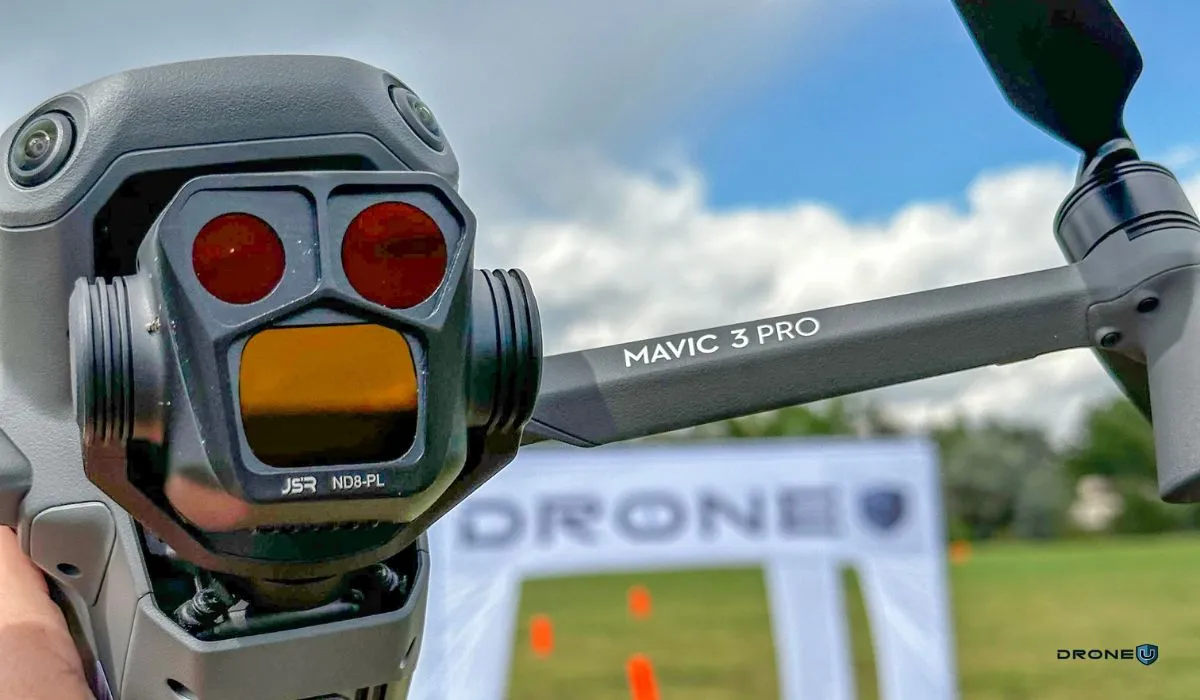 DJI Mavic 3 Pro
DJI Mavic 3 Pro
Ah, behold the Mavic 3 Pro – the director’s cut of drones, the Spielberg of the skies.
It’s not just a drone; it’s the MVP for any videographer out there.
Imagine three cameras at variable zooms. It’s like having a trio of cinematographers at your beck and call.
You want those jaw-dropping shots?
This camera drone has got you covered, offering the best possible choices for your cinematic dreams.
And let’s talk about its flight capabilities – this bad boy is basically an aerial Picasso.
Hyperlapses, panoramas, and those stylish dronie shots?
Oh yeah, it’s got the moves to make your footage dance in the skies.
But here’s the showstopper: With 48 megapixels of pure photographic magic and the ability to capture videos in up to 5.1K, it goes beyond your expectations.
And it doesn’t stop there.
It dives into the world of slow-mo with the grace of a ballet dancer. From 4K at 120 frames per second, it dishes out cinema-quality slow motions that would make a snail jealous.
Features of DJI Mavic 3 Pro
| Features | Mavic 3 Pro |
| Takeoff Weight | 958 grams |
| Max Flight Time | 43 Mins |
| Max Flight Distance | 28 Km |
| Camera | Hasselblad Camera: 4/3 CMOS, Effective Pixels: 20 MP
Medium Tele Camera: 1/1.3? CMOS, Effective Pixels: 48 MP Tele Camera: 1/2? CMOS, Effective Pixels: 12 MP |
| Max Video Resolution | 5.1K @50fps, DCI 4K @120fps, 4K @120fps |
| Video Format | MP4/MOV |
| Obstacle Sensing | Omnidirectional |
| Transmission System | DJI O3+ |
8. DJI Mini 3 Pro
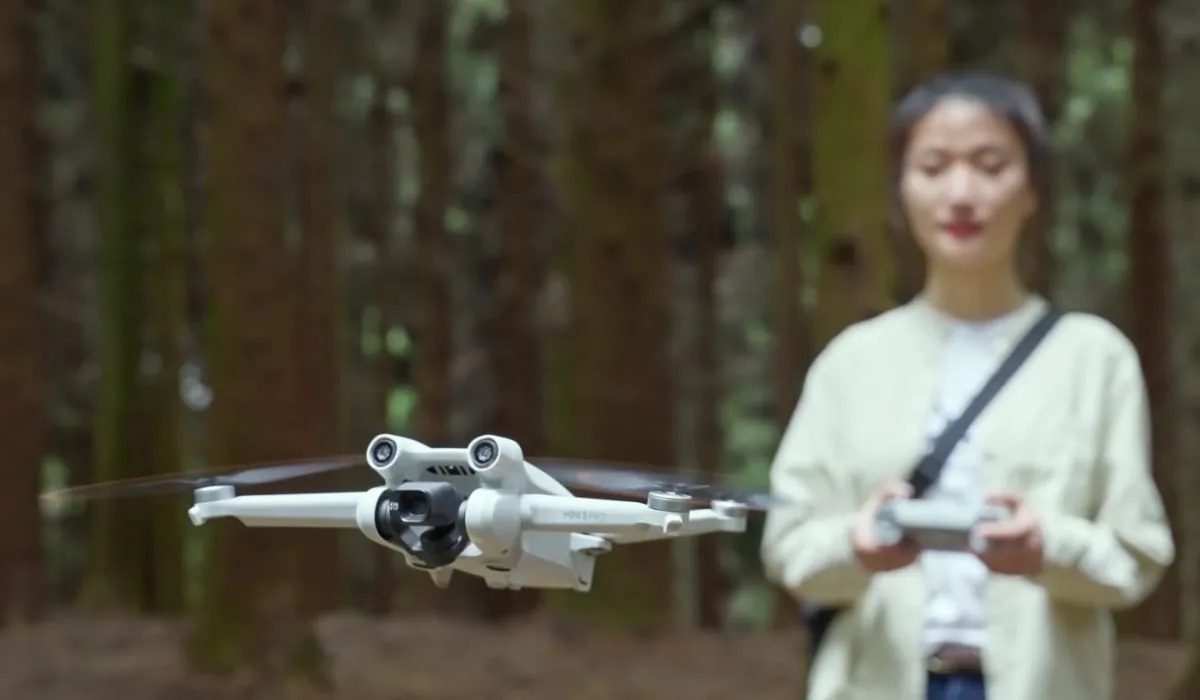 DJI Mini 3 Pro | Source: DJI
DJI Mini 3 Pro | Source: DJI
Enter the stage, the Mini 3 Pro drone – your penny-saving pal and the genie granting your social media wishes.
It might be mini, but it’s majorly cool.
Calling all budget-conscious content creators, this drone is your wingman for that high-end portrait or snazzy vertical video.
It’s like having your director whispering, “Lights, camera, action!”
Clocking in at less than 250 grams, this featherweight champ doesn’t just fly high; it can soar over people too.
With a nifty wide-angle camera, it’s the David ready to take on Goliath in the social media influencer world.
Now, it’s got its remote, its little control center, making it a boss in its own right. But, fair warning:
While it’s got all these fantastic features, it’s like that daredevil friend who jumps into things headfirst – it’s missing the obstacle avoidance superpowers that the Mini 4 Pro flaunts.
So, for those who want an affordable buddy to capture their social media glitz without breaking the bank, the Mini 3 Pro is the MVP.
It might not have all the bells and whistles, but it’s like that charming buddy who surprises you with its hidden talents.
Here’s the kicker: Forget your slider, jib, crane, and gimbal. This drone doesn’t just step up the game; it IS the game. It’s the Swiss Army knife of videography, slicing through the need for multiple gears.
So, if you’re a videographer dreaming of that perfect shot, aiming for the kind of footage that makes jaws drop, the Mavic 3 Pro would be the most useful camera drone for you. It will be your new favorite colleague in the art of capturing visual masterpieces.
Features of Mini 3 Pro
| Features | DJI Mini 3 Pro |
| Takeoff Weight | < 249 grams |
| Max Flight Time | 34 Mins |
| Max Flight Distance | 18 Km |
| Camera | 1/1.3-inch CMOS Wide-Angle Camera |
| Max Video Resolution | 4K/60fps |
| Video Format | MP4/MOV |
| Obstacle Sensing | Forward, backward, and downward |
| Transmission System | DJI O3 |
Summary
Here is a table that compares all camera drones with some important factors to consider:
| Drone | Camera quality | Flight performance | Portability | Ease of Use | Website Price | On Amazon
(Dynamic) |
| DJI Air 3 | 4K/60fps | 46 minutes | Foldable | Easy to use | $1,549 | $1,425 |
| DJI Mini 4 Pro | 4K/60fps | 34 minutes | Foldable | Easy to use | $759 | $759 |
| DJI Avata | 4K/60fps | 18 minutes | Not foldable | Difficult to use | $1,428 | $1,187 |
| DJI Inspire 2 | 5.2K/30fps | 27 minutes | Not foldable | Difficult to use | $3,299 | $2,979 |
| Freefly Astro | 6K/40fps | 37 minutes | Not foldable | Difficult to use | $25,255 | Unavailable |
| DJI Mavic 3 Enterprise | 4K/30fps | 45 minutes | Foldable | Difficult to use | $3,628 | Unavailable |
| DJI Mavic 3 Pro | 5.1K/50fps | 43 minutes | Foldable | Easy to use | $2,199 | $2,068 |
| DJI Mini 3 Pro | 4K/60fps | 34 minutes | Foldable | Easy to use | $909 | $775 |
Our Pick: Which Camera Drone Is Right For You?
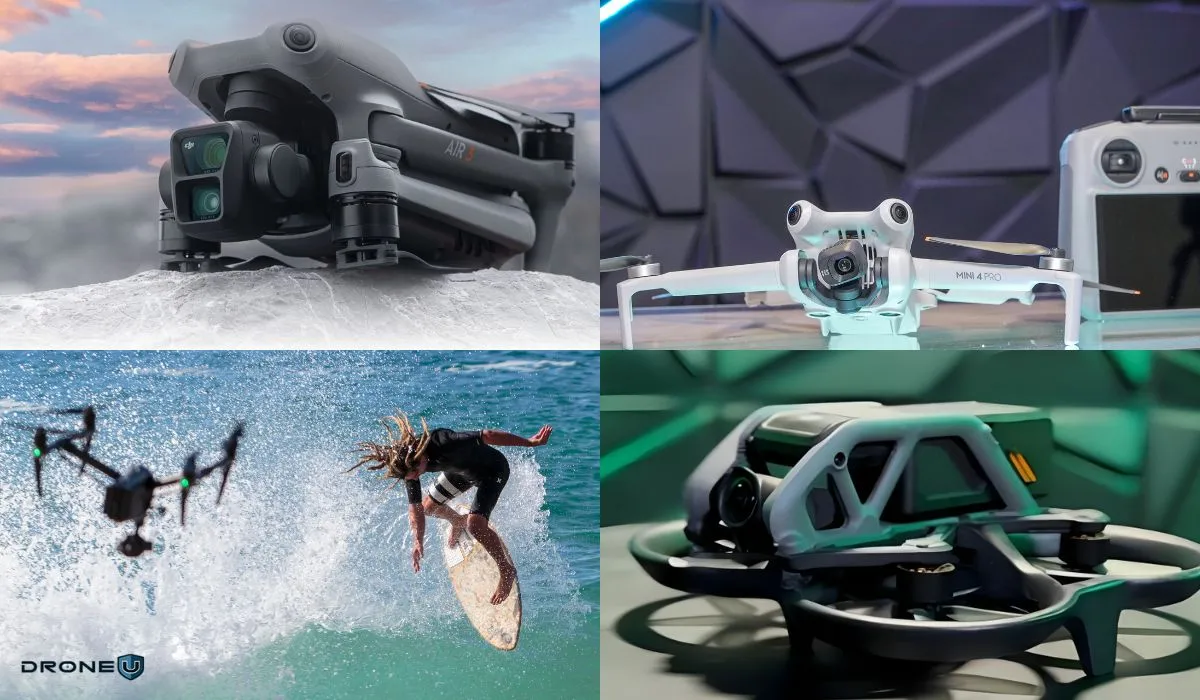
| Drone | Best For |
| DJI Air 3 | All-around Drone |
| DJI Mini 4 Pro | Social Media Content Creators |
| DJI Avata | Fly-Through Drone |
| DJI Inspire 2 | Best Action Sports and Cinema Drone |
| Freefly Astro (US Manufacturer) | Videography & Drone Mapping |
| DJI Mavic 3 Enterprise | Professional Drone Mappers |
| DJI Mavic 3 Pro | Full-Time Videographers |
| DJI Mini 3 Pro | Budget-friendly Drone |
Ready to learn how to fly, check out our Course List to gain confidence in flight. Master operations or learn how to turn your passion into profit with our courses, designed and built from experience.
Frequently Asked Questions
1. What is the best American made drone with a camera?
The Freefly Astro is one of the best American-made drones, known for its creative mapping capabilities. This exceptional drone is highly regarded for its ability to provide creative solutions in the field of mapping and surveying.
On the other hand, the Wingtra One is a superb selection among fixed-wing drones. The Wingtra One offers a unique blend of long-range capabilities and the ability to cover large areas swiftly. Its fixed-wing design enables extended flight times and exceptional stability, making it an ideal choice for applications that demand extensive coverage and high-quality aerial data collection.
2. What cameras do drones use?
Drones typically use built-in cameras or attachable camera gimbals. These cameras can range from basic, lower-resolution cameras for recreational use to high-end, professional-grade cameras for aerial photography and videography. Some popular drone camera brands include Hasselblad, Sony, and Zenmuse (DJI’s camera line). Many drones also support the attachment of action cameras like GoPro.
3. How far can camera drones fly?
The maximum range a drone can fly largely depends on its design and capabilities. Consumer drones typically have a range of 5-12 kilometers, while professional-grade drones may have longer ranges. Keep in mind that drone regulations may require you to keep the drone within visual line of sight in many countries.
4. How high can drones fly?
The maximum altitude a drone can reach also depends on its design and regulations. In many countries, including the United States, the maximum legal altitude for drones is 400 feet (120 meters) above ground level. However, some professional drones may be capable of flying higher, subject to specific permits and regulations.
Please note that drone laws and regulations are subject to change, so it’s crucial to check the latest rules and guidelines from your local aviation authority or government before flying a drone.







Add Your Comment